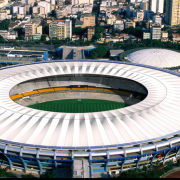Clean energy meets the beautiful game
The carbon footprint for the 2014 FIFA World Cup will be reduced with the aid of solar power installed at two of Brazil’s major stadiums where the games are being held. While it may be unnoticeable to the hundreds of thousands of soccer fans, this World Cup sets a benchmark in football’s 83-year history as being one of the most environmentally sustainable events that has ever been staged.
Having sponsored the World Cup since 2010, Yingli Solar has actively participated in FIFA’s ‘Football for the Planet’ environmental program. FIFA’s program looks at mitigating the negative impact of the competition’s activities on the environment by focusing on climate change, greener stadiums and waste management.
FIFA will reduce the carbon footprint of the tournament and develop measures to avoid, reduce and offset its emissions for many of the FIFA World Cup stadiums in Brazil. It has achieved its Leadership in Energy and Environmental Design Certification for many of its stadiums in Brazil.
To minimise the game’s carbon footprint, over 1500 Yingli Solar photovoltaic rooftop panels will power the Maracana stadium in Rio de Janeiro, one of football’s most iconic venues and the largest stadium in South America, with seating for more than 78,000 spectators. Another 3650 Yingli panels have also been installed as a ground mount at Arena Pernambuco in Recife, which will make this the first solar power plant in the State of Pernambuco. This will provide an total annual solar energy yield of over 1.72MW which is equivalent to planting 10,000 trees in Brazil.
The Maracana Stadium solar PV installation has a capacity of 390kWp and it will provide enough electricity to power 240 homes annually and reduce Brazil’s carbon emission by 2560 tonnes each year. One of the key issues Yingli Solar’s installation partners, Light ESCO and EDF Consultoria, had to overcome was the challenge posed by the stadium’s canvas roof which required the solar panels to be mounted on a metal ring that circled the top of the stadium. The prominent placement of these panels will bring green energy to the global stage during the football competitions, helping to raise awareness of solar power among football fans worldwide.
Arena Pernambuco’s solar PV system is expected to generate more than 1500 MWh of clean energy each year. This is equivalent to the annual electricity consumption of approximately 6000 Brazilians and the system will meet 30 per cent of Arena Pernambuco's electricity demand. When the stadium is not in use, solar power will be delivered to the local community's electricity grid through Brazil's net energy metering program. Visitors to the stadium will be able to track the system's performance at a Visitor Centre designed to educate the public about solar energy. The installation includes sophisticated solar generation and weather monitoring stations to support the city’s solar energy research and development.
In addition to providing solar power to Maracana Stadium and Arena Pernambuco, Yingli Solar will also provide charging stations in stadiums and solar powered information towers. Yingli Solar will be the first carbon neutral sponsor for the 2014 cup. Plans are underway to offset all carbon emissions arising from the company’s promotional activities working with ClimatePartner, to accurately calculate and verify emissions data for the duration of Yingli’s sponsorship activation in Brazil. The carbon footprint will be offset through carbon emission reduction certificates that are generated from a project in Brazil that is certified by the Bureau Veritas Certification Holding SAS.
Yingli Solar’s partnership with FIFA will raise the awareness for solar power and help promote the message of sustainability to millions of people around the world that might not otherwise be exposed to solar energy.
Brazil currently faces an energy crisis and solar can play an important role in solving this challenge. Football is the world’s most popular sport with the broadest population base of fans throughout the world. As a sponsor of the World Cup, Yingli Solar can increase the consumer’s awareness of how renewable energy and sustainability is part of everyday life. It will leave a legacy in Brazil during and after the games to ensure that a positive impact on the environment remains with a range of solar options to generate electricity in Brazil for the years ahead.
Daman Cole is managing director of Yingli Solar Australia, New Zealand and the Pacific.
















